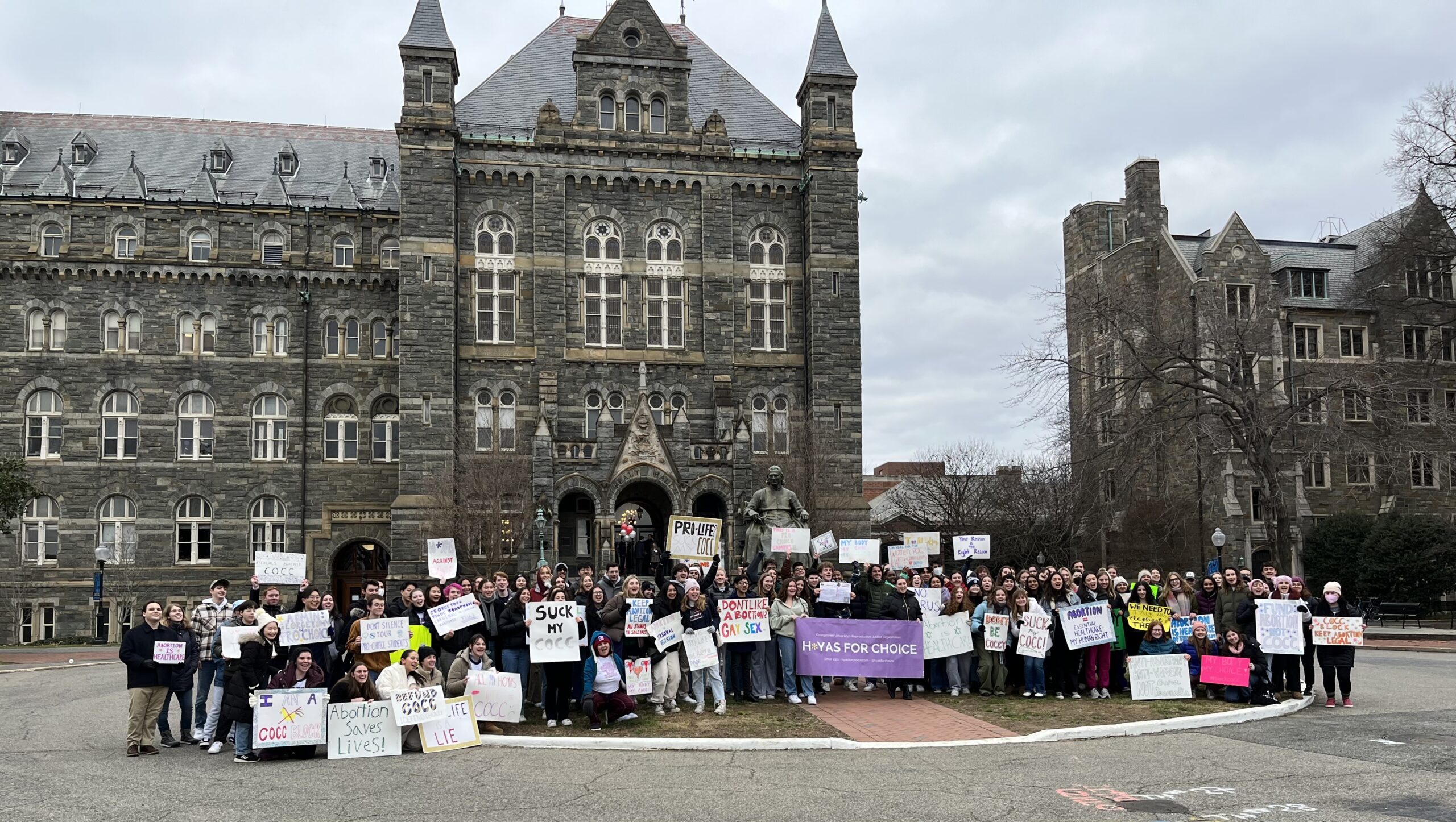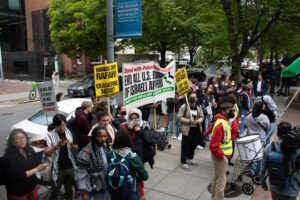Content warning: this article references anti-abortion, anti-LGBTQ+, and misogynistic rhetoric.
On Jan. 21, over a hundred Georgetown students took to the Healy steps to protest the 24th Cardinal O’Connor Conference (OCC), the largest student-run anti-abortion conference in the U.S., which Georgetown University has hosted annually since 2000. On the brisk Saturday morning, student protestors gathered as the conference’s check-in began at 8 a.m., voicing their discontent into a speakerphone and advocating for institutional reform.
This protest was organized by H*yas for Choice (HFC), Georgetown’s pro-abortion-rights group, the sole accessible contraceptive provider, and the only comprehensive resource on campus for information on sexual health services. The university has refused to officially recognize HFC since its founding in 1991, citing the organization’s misalignment with Georgetown’s Catholic teachings and ideology. As a fully donation-funded organization, HFC has organized protests against various anti-abortion events on campus, including the historically controversial OCC.
“We understand that this conference and its different speakers, the different rhetoric that it uses, helps create an unsafe environment on campus that we are not okay with,” HFC President Nina Yee (CAS ’23) told the Voice during the protest, expressing her frustrations with the university’s continued dismissal of protesters’ demands as well as the promotion of values that she argues are not shared by the majority of the student body.
This year’s keynote speaker, Jeanne Mancini, is a prominent member of the anti-abortion movement and has held the role of president of the March for Life Education and Defense Fund since the fall of 2012. She is also affiliated with the Family Research Council (FRC), an organization designated by the Southern Poverty Law Center (SPLC) as a hate group that is anti-LGBTQ+.
Matteo Caulfield (COL ’23), the senior director of the 2023 OCC Board, a sub-board of Georgetown Right to Life (RTL), was frustrated by the controversy surrounding Mancini.
“When there’s hate on a figure, like Jeanne Mancini, I’m sure you can pick apart and be nitpicky that she is probably a more conservative person,” Caulfield said. “But the thing that she represents is fully endorsed by the Catholic church.”
Mancini, however, was not the only controversial speaker at the OCC. Panelist Catherine Glenn Foster, the president of Americans United for Life, previously worked with the Catholic Family and Human Rights Institute as well as the Alliance Defending Freedom. Both of these organizations, like the FRC, are anti-LGBTQ+ and support legislation aiming to recriminalize homosexuality in the U.S. and abroad.
Cardinal O’Connor, the conference’s namesake, notably perpetuated homophobia throughout his lifetime by publicly rejecting a policy that would have allowed for AIDS education programs and preventing condom distribution during the height of the epidemic. He dismissed the thousands of deaths due to unsafe abortions and claimed they could have “chosen not to abort.”
Caulfield acknowledged O’Connor’s “complex legacy,” but claimed that pro-abortion rights protesters call the conference homophobic to distract from the true message of the conference, which he said is the care for the most vulnerable human being.
“[O’Connor] was one of the first bishops to acknowledge the pain of gay people and patients with aids,” Caulfield said. “I think that there is more perspective to bring out and way more nuance to his legacy than people at Georgetown try to admit.”
This year’s OCC is the first to take place in a post-Roe era, in which access to reproductive rights is being rampantly attacked. The theme of the conference this year is Next Steps: Humanizing the Political System, focusing on the next steps for the anti-abortion movement following Roe’s reversal.
Concerned HFC members expressed that Georgetown’s endorsement of the conference contradicts its claims to equitably support students of historically underrepresented identities.
“I think that providing a platform for these sorts of ideologies, like anti-LGBTQ ideologies, racist ideologies, sexist ideologies, it demonstrates to students that that’s really what Georgetown stands for,” HFC vice president Lauryn Ping (CAS ’23) said.
The OCC conference is completely student-run, according to Caulfield, with about 15 members on the board and around 60 to 70 volunteers. He referenced the campus involvement and attendance of the Catholic Women at Georgetown, the Georgetown Knights of Columbus, Catholic Campus Ministry, and the Jesuits of Georgetown University. According to university data provided to the Voice by HFC, 20 percent of OCC attendees in 2019 were Georgetown students.
Despite students’ frustration with the conference, Ping said that HFC recognizes the impact of widespread misinformation, particularly in young people who might not have had the chance to develop their own opinions, and ultimately aims to educate instead of create further division.
“Part of our framing of this is that we’re not angry at the people attending the conference because we know that there’s a lot of indoctrination,” she said. “We firmly believe that if they were shown the right facts and shown the real impact of denying people abortion access, that they would change their minds. And so our goal is really not to shame people, but to educate people and make them really reflect on their views and realize that there are different alternate ways of thinking.”
Ping added that the funding for the OCC could be redirected to areas that she argued would better serve the Georgetown community.
“There’s also different academic programs like the Women’s Center, the LGBTQ center, and the Women in Gender Studies program,” she said. “All these programs are doing such amazing things for students, but they have limited budgets to do so. If the money that’s going into this conference can go back into the student audience, that would really help make Georgetown better.”
Miriam Siegel (CAS ’26), a member of HFC, would like for Georgetown to stop hosting the OCC, denounce the speakers and the affiliated organizations, and most importantly, fund HFC.
“Georgetown will not fund an organization that is just trying to provide contraceptive care, which is healthcare to students, but they will fund and support a conference that includes keynote speakers and panelists who are anti-choice, who are part of hate groups,” Siegel said
Caulfield, however, thinks that the OCC is here to stay. “It is a Catholic conference and it’s gonna continue to be a Catholic conference. It is based in Catholic social teachings and we’re excited to keep our Catholic conference at our Catholic university to have Catholic speakers speak on Catholic ethics,” he said.
Siegel, who was originally drawn to Georgetown because of its Jesuit values, thinks that the OCC contradicts such values.
“Cura Personalis should include healthcare and abortion is healthcare,” Siegel said. “I think that this event is in direct contrast to the Jesuit values that influenced my decision to come here.”
Editor’s note: This article was updated on 12/20/24 at 2:17 p.m. to strike a quote.






